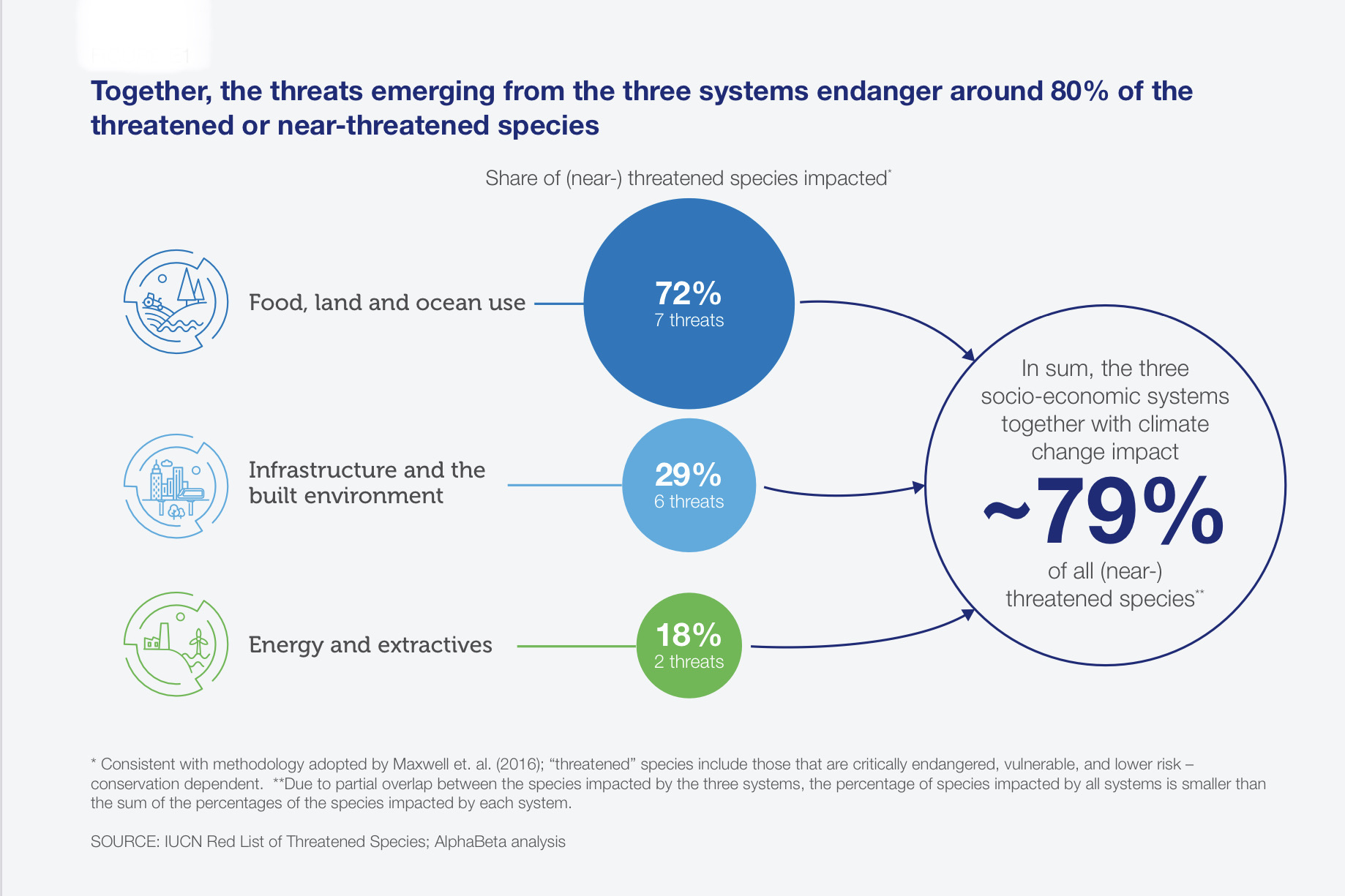
- Sustainable Planet -
- 7mins -
- 378 views
Here’s how a nature-led recovery could rebuild economies and generate $10tn every year post-pandemic
WEF report says 400m jobs, economic stability and protection for food supplies are among benefits to the global population if governments pursue nature-led approach to rebuilding economies, and warn there will be ‘no jobs on a dead planet’
Green recovery could generate $10tn a year, says WEF
Focusing on a green recovery from the Coronavirus pandemic could boost the global economy by $10 trillion (€8.73 trillion/£7.9 trillion) a year and create 395 million jobs by 2030 according to a new report by the World Economic Forum. Amid “unprecedented job losses and economic uncertainty”, focusing on “nature positive solutions”, could provide a blueprint towards future prosperity, the World Economic Forum said.

“There will be no jobs or prosperity on a dead planet,“
The report, from the New Nature Economy project, published by the World Economic Forum, says a nature-first approach from business and political leaders will be a jobs-first solution.
“There will be no jobs or prosperity on a dead planet,” warns Alan Jope, chief executive of Unilever and a WEF partner, as reported by The Guardian.
WEF, which brings together leaders and hosts the annual Davos summit, said three sectors were responsible for endangering 80% of threatened species – food and land use, infrastructure and building, and energy and mining. But it said these sectors also had the most to gain from a nature-led recovery.
The report says: “We are reaching irreversible tipping points for nature and climate. If recovery efforts do not address the looming planetary crises, a critical window of opportunity to avoid their worst impact will be irreversibly lost. Decisions on how to deploy the post-Covid crisis stimulus packages will likely shape societies and economies for decades.”
Akanksha Khatri, head of WEF’s Nature Action Agenda, said: “Nature can provide the jobs our economies need. There is nothing stopping businesses and governments from implementing these plans today, at scale, to re-employ millions.”
Carlos Alvarado Quesada, president of Costa Rica, said: “We must use the coronavirus crisis as an opportunity to reset humanity’s relationship with nature. [My country] has shown that the transition to a carbon-neutral, nature-positive, economy brings greater prosperity and jobs. It’s time to mainstream this model.”
Source: TheGuardian
New Nature Economy report’s key findings at a glance
- There is no future for business as usual – we are reaching irreversible tipping points for nature and climate, and over half of the global GDP ($44 trillion) is potentially threatened by nature loss.
- Fighting climate change is essential but not enough to address the nature crisis – a fundamental transformation is needed across three socio- economic systems: food, land and ocean use; infrastructure and the built environment; and energy and extractives.
- 80% of threatened and near-threatened species are endangered by the three systems, which are responsible for the most significant business-related pressures to biodiversity; these are also the systems with the largest opportunity to lead in co-creating nature-positive pathways.
- 15 systemic transitions with annual business opportunities worth $10 trillion that could create 395 million jobs by 2030 have been identified that together can pave the way towards a people- and nature-positive development that will be resilient to future shocks.
- Businesses can take practical actions to turn these opportunities into reality by working with governments and civil society to set the agenda, push the transitions forward and accelerate policy reforms.
- $2.7 trillion per year through to 2030 will be needed to scale the transitions, including to deploy the technological innovation critical to 80% of the business opportunity value identified

Almost a third of the world’s land and oceans could be protected while bolstering the economy
Many high-level observers, including economists, health professionals, climate experts, and developing countries, have urged governments and business to pursue a green recovery but largely focused on tackling the climate emergency, reported The Guardian.
Another report in July concluded that almost a third of the world’s land and oceans could be protected while bolstering the economy. The UN has also warned that the world is currently only treating the health and economic symptoms of the pandemic, not the cause – the environmental destruction.
The WEF report proposes a range of measures for boosting jobs and economies, such as:
- Cutting food waste by providing metal silos and crates to keep food from rotting.
- Better management of wild fish too could boost catches and add 14m jobs and $170 billion in value, it says.
- It is also vital to end the $2 billion subsidies given daily to agriculture which damage the planet, the WEF report says.
“This expenditure of public money is actually creating harmful effects on the public good,” said Khatri. “Something is significantly broken in our system.”
In cities, retrofitting to increase energy efficiency could save $825 billion by 2030, the report says, while the market for urban green roofs is already worth $9 billion and could grow rapidly.
Renewable energy is also a huge investment opportunity and already matches the cost of fossil fuels in 30 countries, while the use of human sewage as an energy source is rising.
WEF acknowledged that some workers would lose their jobs in unsustainable industries and urged governments to ensure people were retrained and that the transition to a green economy was fair to all. It estimates that $2.7 trillion of annual investment is required to fund all the opportunities identified in the report, a sum similar to the stimulus package announced by the US in March.
Jennifer Morris, head of The Nature Conservancy, a US based organisation, said: “Nature simply cannot afford for us to waste any more time. None of this will be easy, system change at this scale never is. But WEF’s report underlines that it is our collective responsibility to transform the ways in which we eat, live, grow, build, and power our lives.”
Source: The Guardian

sustainable ecosystem management is one way to tap into a $40bn opportunity
The report says 191 million new jobs could be created if new approaches are taken to diversifying humans’ diets.
- It notes some 75% of the world’s food comes from just 12 plant and five animal species.
- Animal products provide 18% of calories but take up 80% of farmland.
- A more diversified diet of vegetables and fruits can create $310bn (€270bn/£245bn) in business opportunities annually by 2030.
Meanwhile, wild fish stocks are declining calamitously. It takes five times the effort to catch the same amount of fish now as it did in 1950, the report states.
If the “business as usual” approach continues, wild fish stocks will decline by 15%. This will cost the industry $83bn, as boats will have to travel further and fish deeper.
However, sustainable ecosystem management is one way to tap into a $40bn opportunity for the maritime industry worldwide, the WEF said.
Other key initiatives include retrofitting buildings to make them more efficient in both conserving heat and being well-ventilated. This would provide further major job opportunities.
In the energy sector there is an opportunity to create 87 million jobs and $3.5 trillion in business opportunities by 2030, the report states.
The authors said stimulus packages for solar and other renewables can not only generate millions of new jobs, but solar energy, even without subsidies matched existing fossil fuel costs in over 30 countries and were projected to be cheaper than coal in China and India by 2021.
Inger Andersen, United Nations under-secretary-general and executive director of the UN Environment Programme, told The Guardian: “As we enter into a historic decade of action to halt and reverse biodiversity loss by 2030 and address climate change, business has a critical role to play in environmental stewardship of our planet,”
“They have the technology, innovation and financing to make the shifts we need towards increased investment in nature’s infrastructure and nature-based solutions.”
Source: TheIndependent
![Ok, not literally, but you know what we mean. Carlos Alvarado Quesada, president of Costa Rica, said: “We must use the coronavirus crisis as an opportunity to reset humanity’s relationship with nature. [My country] has shown that the transition to a carbon-neutral, nature-positive, economy brings greater prosperity and jobs. It’s time to mainstream this model.”](https://www.brightvibes.com/wp-content/uploads/legacy/phpvE7ukC.jpeg)

